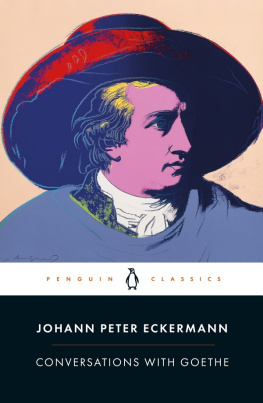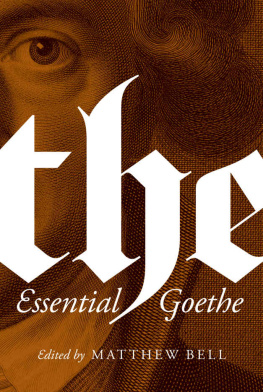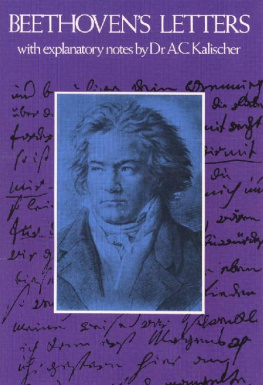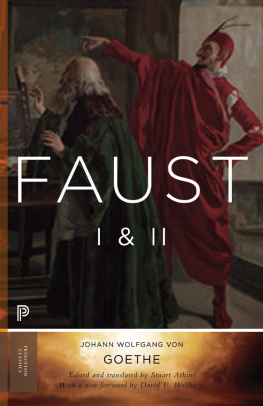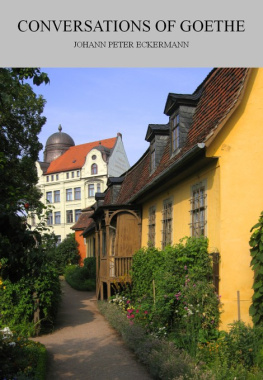Johann von Goethe - Egmont
Here you can read online Johann von Goethe - Egmont full text of the book (entire story) in english for free. Download pdf and epub, get meaning, cover and reviews about this ebook. year: 2015, publisher: epubBooks Classics, genre: Art. Description of the work, (preface) as well as reviews are available. Best literature library LitArk.com created for fans of good reading and offers a wide selection of genres:
Romance novel
Science fiction
Adventure
Detective
Science
History
Home and family
Prose
Art
Politics
Computer
Non-fiction
Religion
Business
Children
Humor
Choose a favorite category and find really read worthwhile books. Enjoy immersion in the world of imagination, feel the emotions of the characters or learn something new for yourself, make an fascinating discovery.

- Book:Egmont
- Author:
- Publisher:epubBooks Classics
- Genre:
- Year:2015
- Rating:4 / 5
- Favourites:Add to favourites
- Your mark:
- 80
- 1
- 2
- 3
- 4
- 5
Egmont: summary, description and annotation
We offer to read an annotation, description, summary or preface (depends on what the author of the book "Egmont" wrote himself). If you haven't found the necessary information about the book — write in the comments, we will try to find it.
Egmont — read online for free the complete book (whole text) full work
Below is the text of the book, divided by pages. System saving the place of the last page read, allows you to conveniently read the book "Egmont" online for free, without having to search again every time where you left off. Put a bookmark, and you can go to the page where you finished reading at any time.
Font size:
Interval:
Bookmark:
Egmont
A Tragedy in Five Acts
Johann Wolfgang von Goethe
Introductory Note
In 1775, when Goethe was twentysix, and before he went to Weimar, he began to write "Egmont" After working on it at intervals for twelve years, he finished it at Rome in 1787.
The scene of the drama is laid in the Low Countries at the beginning of the revolt against Spain. In the fifteenth century Philip of Burgundy had usurped dominion over several of the provinces of the Netherlands, and through him they had passed into the power of his descendant, the Emperor Charles V. This powerful ruler abolished the constitutional rights of the provinces, and introduced the Inquisition in order to stamp out Protestantism. Prominent among his officers was the Fleming, Lamoral, Count Egmont, upon whom he lavished honors and opportunities of serviceopportunities so well improved that, by his victories over the French at SaintQuentin (1557) and Gravelines (1558) Egmont made a reputation as one of the most brilliant generals in Europe, and became the idol of his countrymen. When in 1559 a new Regent of the Netherlands was to be created, the people hoped that Philip II, who had succeeded Charles, would choose Egmont; but instead he appointed his halfsister Margaret, Duchess of Parma. Under the new Regent the persecution of the Protestants was rigorously pressed, and in 1565 Egmont, though a Catholic, was sent to Madrid to plead for clemency. He was received by the King with every appearance of cordiality, but shortly after his return home the Duke of Alva was sent to the Netherlands with instructions to put down with an iron hand all resistance to his master's will. How terribly he carried out his orders has been told by Prescott and Motley. Egmont was an early victim, but his martyrdom, with that of Count Horn, and later the assassination of William of Orange, roused the Netherlands to a resistance that ended only with the complete throwing off of the Spanish yoke.
Such in outline is the background chosen by Goethe for his tragedy. With many changes in detail, the dramatist has still preserved a picture of a historical situation of absorbing interest, and has painted a group of admirable portraits. The drama has long been a favorite on the stage, where it enjoys the advantage of Beethoven's musical setting.
Dramatis Personae
Margaret of Parma, (Daughter of Charles V., and Regent of the Netherlands)
Count Egmont, (Prince of Gaure)
The Duke of Alva
William of Orange
Ferdinand, (his natural Son)
Machiavel, in the service of the Regent
Richard, (Egmont's Private Secretary)
Silva, Gomez, (in the service of Alva)
Clara, (the Beloved of Egmont)
Her Mother
Brackenburg, (a Citizen's Son), and Vansen, (a Clerk)
Soest, (a Shopkeeper), Jetter, (a Tailor), A Carpenter, A Soapboiler (Citizens of Brussels)
Buyck, (a Hollander), a Soldier under Egmont
Ruysum, (a Frieslander), an invalid Soldier, and deaf
People, Attendants, Guards, etc.
The Scene is laid in Brussels.
Act I
Scene I
Soldiers and Citizens (With Cross-bows)
Jetter (steps forward, and bends his crossbow). Soest, Buyck, Ruysum
Soest. Come, shoot away, and have done with it! You won't beat me! Three black rings, you never made such a shot in all your life. And so I'm master for this year.
Jetter. Master and king to boot; who envies you? You'll have to pay double reckoning; 'tis only fair you should pay for your dexterity.
Buyck. Jetter, I'll buy your shot, share the prize, and treat the company. I have already been here so long, and am a debtor for so many civilities. If I miss, then it shall be as if you had shot.
Soest. I ought to have a voice, for in fact I am the loser. No matter! Come, Buyck, shoot away.
Buyck (shoots). Now, corporal, look out!One! Two! Three! Four!
Soest. Four rings! So be it!
All. Hurrah! Long live the King! Hurrah! Hurrah!
Buyck. Thanks, sirs, master even were too much! Thanks for the honour.
Jetter. You have no one to thank but yourself. Ruysum. Let me tell you
Soest. How now, greybeard?
Ruysum. Let me tell you!He shoots like his master, he shoots like Egmont.
Buyck. Compared with him I am only a bungler. He aims with the rifle as no one else does. Not only when he's lucky or in the vein; no! he levels, and the bull'seye is pierced. I have learned from him. He were indeed a blockhead, who could serve under him and learn nothing!But, sirs, let us not forget! A king maintains his followers; and so, wine here, at the king's charge!
Jetter. We have agreed among ourselves that each
Buyck. I am a foreigner, and a king, and care not a jot for your laws and customs.
Jetter. Why, you are worse than the Spaniard, who has not yet ventured to meddle with them.
Ruysum. What does he say?
Soest (loud to Ruysum). He wants to treat us; he will not hear of our clubbing together, the king paying only a double share.
Ruysum. Let him! under protest, however! 'Tis his master's fashion, too, to be munificent, and to let the money flow in a good cause. (Wine is brought.)
All. Here's to his Majesty! Hurrah!
Jetter (to Buyck). That means your Majesty, of course, Buyck. My hearty thanks, if it be so.
Soest. Assuredly! A Netherlander does not find it easy to drink the health of his Spanish majesty from his heart.
Ruysum. Who?
Soest (aloud). Philip the Second, King of Spain.
Ruysum. Our most gracious king and master! Long life to him.
Soest. Did you not like his father, Charles the Fifth, better?
Ruysum. God bless him! He was a king indeed! His hand reached over the whole earth, and he was all in all. Yet, when he met you, he'd greet you just as one neighbour greets another,and if you were frightened, he knew so well how to put you at your easeay, you understand mehe walked out, rode out, just as it came into his head, with very few followers. We all wept when he resigned the government here to his son. You understand mehe is another sort of man, he's more majestic.
Jetter. When he was here, he never appeared in public, except in pomp and royal state. He speaks little, they say.
Soest. He is no king for us Netherlanders. Our princes must be joyous and free like ourselves, must live and let live. We will neither be despised nor oppressed, goodnatured fools though we be.
Jetter. The king, methinks, were a gracious sovereign enough, if he had only better counsellors.
Soest. No, no! He has no affection for us Netherlanders; he has no heart for the people; he loves us not; how then can we love him? Why is everybody so fond of Count Egmont? Why are we all so devoted to him? Why, because one can read in his face that he loves us; because joyousness, openheartedness, and goodnature, speak in his eyes; because he possesses nothing that he does not share with him who needs it, ay, and with him who needs it not. Long live Count Egmont! Buyck, it is for you to give the first toast; give us your master's health.
Buyck. With all my heart; here's to Count Egmont! Hurrah!
Ruysum Conqueror of St. Quintin.
Buyck. The hero of Gravelines.
All. Hurrah!
Ruysum. St. Quintin was my last battle. I was hardly able to crawl along, and could with difficulty carry my heavy rifle. I managed, notwithstanding, to singe the skin of the French once more, and, as a parting gift, received a grazing shot in my right leg.
Buyck. Gravelines! Ha, my friends, we had sharp work of it there! The victory was all our own. Did not those French dogs carry fire and desolation into the very heart of Flanders? We gave it them, however! The old hardlisted veterans held out bravely for a while, but we pushed on, fired away, and laid about us, till they made wry faces, and their lines gave way. Then Egmont's horse was shot under him; and for a long time we fought pellmell, man to man, horse to horse, troop to troop, on the broad, flat, seasand. Suddenly, as if from heaven, down came the cannon shot from the mouth of the river, bang, bang, right into the midst of the French. These were English, who, under Admiral Malin, happened to be sailing past from Dunkirk. They did not help us much, 'tis true; they could only approach with their smallest vessels, and that not near enough;besides, their shot fell sometimes among our troops. It did some good, however! It broke the French lines, and raised our courage. Away it went. Helterskelter! topsyturvy! all struck dead, or forced into the water; the fellows were drowned the moment they tasted the water, while we Hollanders dashed in after them. Being amphibious, we were as much in our element as frogs, and hacked away at the enemy, and shot them down as if they had been ducks. The few who struggled through, were struck dead in their flight by the peasant women, armed with hoes and pitchforks. His Gallic majesty was compelled at once to hold out his paw and make peace. And that peace you owe to us, to the great Egmont.
Font size:
Interval:
Bookmark:
Similar books «Egmont»
Look at similar books to Egmont. We have selected literature similar in name and meaning in the hope of providing readers with more options to find new, interesting, not yet read works.
Discussion, reviews of the book Egmont and just readers' own opinions. Leave your comments, write what you think about the work, its meaning or the main characters. Specify what exactly you liked and what you didn't like, and why you think so.

